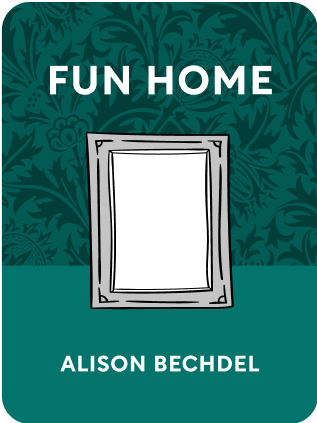

This article is an excerpt from the Shortform book guide to "Fun Home" by Alison Bechdel. Shortform has the world's best summaries and analyses of books you should be reading.
Like this article? Sign up for a free trial here .
What was the Bechdel funeral home? Why is the funeral home an important part of Alison Bechdel’s graphic memoir, Fun Home?
The Bechdel funeral home was Alison Bechdel’s family’s business during her childhood. They ran the funeral home, and Alison and her brothers had free reign in the space. Often they found it much better than their actual home, leading them to nickname it “Fun Home.”
Read more about the Bechdel Funeral Home and how it helped inspire Alison Bechdel to write her book.
“Fun Home” Funeral Home
Fun Home is a graphic memoir by cartoonist Alison Bechdel. It follows Alison through the early years of her life as she navigates her relationship with her closeted father, discovers her own sexuality, and grapples with her father’s supposed suicide. Told in a non-linear fashion, the book touches on the themes of gender identity, sexual orientation, dysfunctional households, suicide, and literature as a way of connecting to life.
(Shortform note: The author includes many references to literature. For the sake of clarity, this summary includes brief descriptions of the stories and authors referenced. Also, because this is a graphic novel, the summary pulls from both the book’s text and its illustrations.)
Alison Bechdel grew up in an old, Victorian home in Beech Creek, Pennsylvania with her two brothers, mother, and father. Her father, a notably distant man, put more energy into working on their home than he did focusing on his family. When they first bought the house, it was falling apart, but he was determined to restore it to its former glory. He had an affinity for restoration and, often, forced his family to help him with his projects.
The Bechdel Funeral Home
Alison’s great-grandfather founded the Bechdel Funeral Home. Alison’s father took over the family business after his father had a heart attack. Due to the low population, the Bechdel funeral home did not make enough to pay the bills, so he took on a second position at the local high school teaching English.
Alison and her brothers dubbed the Bechdel funeral home the “Fun Home” because they usually had more fun in the “fun home’ funeral home than in their actual home. They played with the chair trolleys, the flower stands, and the smelling salts as they invented worlds of their own. Their grandmother lived in the back and the business was in the front. They would often spend the night at the “Fun Home” and have their grandmother tell them stories about their father’s childhood.
Reacting to Death
One day, Alison’s father asked her to come to the room in the Bechdel funeral home where he embalmed the bodies. On the table was a dead, naked man with his chest cut open. She was shocked to see the man’s genitals as well as his internal organs. Her father asked for a pair of scissors that he easily could have grabbed himself. He may have done this for a few reasons:
- It may have been that he just needed the scissors.
- It may have been the way that her father was exposed to his first cadaver, and her father wanted to continue the tradition.
- It may have been her father’s attempt at eliciting an emotional response to death that he no longer felt.
Later in her life, Alison related to the final reason as she coped with her father’s death. After her father’s death, she would tell people of his passing in a matter-of-fact way to try to elicit an emotional response from them. This was her attempt to emote vicariously through someone else because she wasn’t feeling the sadness or grief that she thought she should be feeling.

———End of Preview———
Like what you just read? Read the rest of the world's best book summary and analysis of Alison Bechdel's "Fun Home" at Shortform .
Here's what you'll find in our full Fun Home summary :
- What it's like to grow up in a funeral home
- Why Alison Bechdel suspected her dad was a closeted homosexual
- Why Alison believes that her father's death may have been a suicide






